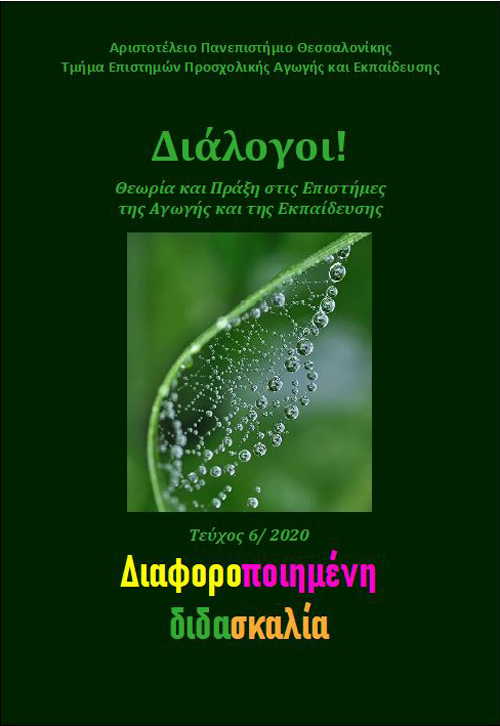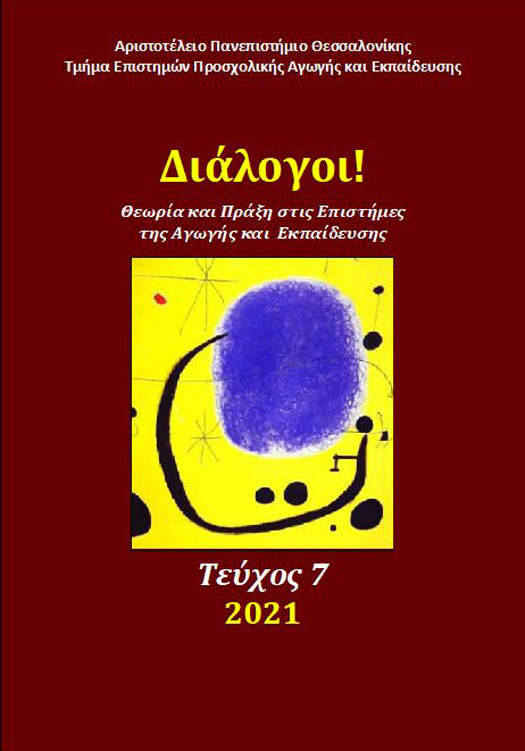Διαφοροποιημένη διδασκαλία στο νηπιαγωγείο: Αναδεικνύοντας τη σημασία της προαξιολόγησης και τη σύνδεσή της με διαδικασίες ανίχνευσης των ιδεών των παιδιών

Περίληψη
Η Διαφοροποιημένη Διδασκαλία (ΔΔ) είναι μια προσέγγιση η οποία αναγνωρίζει, σέβεται και αξιοποιεί διδακτικά την ποικιλομορφία που παρουσιάζει κάθε σχολική τάξη. Δίνει έμφαση όχι μόνο στις γνώσεις και τα ενδιαφέροντα των παιδιών αλλά και στους διαφορετικούς τρόπους, με τους οποίους επικοινωνούν και μαθαίνουν τα παιδιά. Σε αυτή την προοπτική η ΔΔ μπορεί και πρέπει να διεκδικήσει μια θέση στην εκπαιδευτική πρακτική στο νηπιαγωγείο. Στις διαστάσεις της αξιολόγησης που συνδέονται με τη ΔΔ σημαντική θέση έχει η προαξιολόγηση (preassessment) η οποία πραγματοποιείται πριν από την έναρξη της διδασκαλίας. Ανάμεσα στα στοιχεία που συλλέγει ο εκπαιδευτικός κατά τη διαδικασία της προαξιολόγησης είναι η σχέση που έχουν τα παιδιά με το διδακτικό περιεχόμενο που πρόκειται να διδαχθεί. Μια παρόμοια στρατηγική με στενότερη επικέντρωση κυρίως στη μαθησιακή ετοιμότητα των μαθητών ακολουθείται εδώ και πολλές δεκαετίες στο πλαίσιο της διδακτικής των επιστημών στην προσχολική εκπαίδευση. Στην παρούσα μελέτη επιχειρείται μια σύνδεση ανάμεσα στην προαξιολόγηση και την ανίχνευση των ιδεών των παιδιών μέσα από την αξιοποίηση κριτηρίων από τη ΔΔ σε διαδικασίες ανίχνευσης. Μέσα από την παρουσίαση ενδεικτικών παραδειγμάτων φαίνεται ότι μια τέτοια προοπτική μπορεί να διευρύνει την πρόσβαση στην παιδική σκέψη και να διευκολύνει τον εκπαιδευτικό να κάνει επιλογές οι οποίες θα ανταποκρίνονται περισσότερο στα χαρακτηριστικά και τις ανάγκες των παιδιών.
Λεπτομέρειες άρθρου
- Πώς να δημιουργήσετε Αναφορές
-
Καμπεζά Μ. (2020). Διαφοροποιημένη διδασκαλία στο νηπιαγωγείο: Αναδεικνύοντας τη σημασία της προαξιολόγησης και τη σύνδεσή της με διαδικασίες ανίχνευσης των ιδεών των παιδιών. Διάλογοι! Θεωρία και πράξη στις επιστήμες αγωγής και εκπαίδευσης, 6, 97–118. https://doi.org/10.12681/dial.25548
- Τεύχος
- Τόμ. 6 (2020)
- Ενότητα
- Ειδικό Θέμα

Αυτή η εργασία είναι αδειοδοτημένη υπό το CC Αναφορά Δημιουργού – Μη Εμπορική Χρήση – Παρόμοια Διανομή 4.0.
Οι συγγραφείς των άρθρων που δημοσιεύονται στο Διάλογοι! Θεωρία και Πράξη στις Επιστήμες Αγωγής και Εκπαίδευσης διατηρούν τα δικαιώματα πνευματικής ιδιοκτησίας επί των άρθρων τους, δίνοντας στο περιοδικό το δικαίωμα της πρώτης δημοσίευσης. Άρθρα που δημοσιεύονται στο Διάλογοι! Θεωρία και Πράξη στις Επιστήμες της Αγωγής και Εκπαίδευσης διατίθενται με άδεια Creative Commons 4.0 και σύμφωνα με την άδεια μπορούν να χρησιμοποιούνται ελεύθερα, με αναφορά στον/στη συγγραφέα και στην πρώτη δημοσίευση για μη κερδοσκοπικούς σκοπούς και με δικαίωμα τροποποίησης μόνον με παρόμοια διανομή (αν αναμείξετε, τροποποιήσετε, ή δημιουργήσετε πάνω στο υλικό, πρέπει να διανείμετε τις δικές σας συνεισφορές υπό την ίδια άδεια όπως και το πρωτότυπο).
To Τμήμα Επιστημών Προσχολικής Αγωγής και Εκπαίδευσης του Αριστοτέλειου Πανεπιστημίου Θεσσαλονίκης και το Εθνικό Κέντρο Τεκμηρίωσης διατηρούν το δικαίωμα να δημοσιεύουν, να αναπαραγάγουν, να παρουσιάζουν στο κοινό, να διανέμουν και να χρησιμοποιούν άρθρα που δημοσιεύονται στο Διάλογοι! Θεωρία και Πράξη στις Επιστήμες Αγωγής και Εκπαίδευσης σε οποιοδήποτε μέσο και μορφή είτε μεμονωμένα είτε ως μέρη συλλογικών έργων, για όλο το χρόνο διάρκειας προστασίας της πνευματικής ιδιοκτησίας και για όλες τις χώρες του κόσμου.
Αυτό περιλαμβάνει ενδεικτικά, και όχι αποκλειστικά, το δικαίωμα δημοσίευσης των άρθρων σε τεύχη του περιοδικού Διάλογοι! Θεωρία και Πράξη στις Επιστήμες Αγωγής και Εκπαίδευσης, αναπαραγωγής και διανομής μεμονωμένων αντιγράφων των άρθρων, αναπαραγωγής ολόκληρων των άρθρων σε άλλη έκδοση του Τμήματος Επιστημών Προσχολικής Αγωγής και Εκπαίδευσης του Αριστοτέλειου Πανεπιστημίου Θεσσαλονίκης και του Εθνικού Κέντρου Τεκμηρίωσης και αναπαραγωγής και διανομής των άρθρων ή περίληψης αυτών με χρήση πληροφορικού συστήματος αποθετηρίου.



